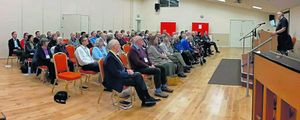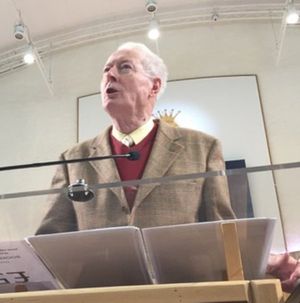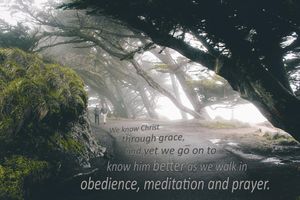Michael Green is well known as a writer of a large number of evangelistic and apologetic books, as a preacher at university missions, as a theologian, and as an evangelical Anglican minister. In this book he reflects on fifty years in the Christian ministry.
I
t is a strange book. It is not an autobiography, although there are a number of autobiographical passages. It is not comment on the current Christian scene, although he provides his own evaluation of the world-wide church. It is not teaching, although again he does reflect on what the Scriptures say on certain themes.
It is, in fact, an amalgam of all these things, and he moves from one mode to another at will. This makes it a frustrating, and yet strangely fascinating book.
Attractive
The man who emerges from these pages is an attractive person — someone with a real love for God and the gospel. There is an enthusiasm about him which carries you along. He is also honest and straightforward in the way he deals with issues. He says of himself, ‘Evangelism is in my blood’, and that is the overwhelming impression that emerges from his book.
The book is in five parts. He starts with an autobiographical section, covering conversion, family and life as a student and family man. The second section reviews his work as a parish minister, teacher, college principal and writer.
In the next two sections he looks at issues in ministerial life and the wider church. The final section is an appreciation of church life in South East Asia, with reflections on the rest of the world.
Important yet confusing
This is a profoundly surprising and even disturbing book — not one that can be recommended to the average Christian.
Nevertheless it is an important book because it demonstrates the confusion that marks the whole concept of what we mean by ‘evangelical’. Michael Green describes himself as an ‘Evangelical’ and would be so regarded by others.
Yet the book leaves you quite unclear as to what the gospel really is, and what is the nature of the church.
These are not new questions, of course, but this book reminds us what fundamental issues they are, and how confused we can become about the answers.
What is the gospel?
Like many Anglicans of his era, Michael Green attended public school where, through personal witness, he was brought to faith in Christ. He was greatly influenced by Rev. E. J. H. Nash (Bash) — who ran Christian camps for boys from public schools and taught them how to live for the Lord.
Undoubtedly these camps did much good, producing men who became extremely influential, especially in Anglican circles.
Nevertheless, the view of conversion that comes out of his early experiences, and then flows through the whole book, is highly subjective and Arminian.
It is, however, in the ambiguous definition of what a Christian is that the book is at its most surprising and distressing. From my own personal reading of Michael Green I would have expected much more clarity.
Ambiguity
In one section he explains how he came to write or edit various books that have been used by Christian people with profit. One such book was The truth of God Incarnate — a response to the book The myth of God Incarnate.
However, in his discussion we see a surprising ambiguity in his assumption that the people he opposes are Christians. He refers to the contributors to ‘The myth’ as ‘professed Christian scholars who, in fact, had allowed secularist presuppositions to cloud their Christian understanding’.
But can someone have a ‘Christian understanding’ if they deny the deity of Christ? The apostle John is very clear that whatever understanding they have it cannot be Christian (1 John 4:2-3; 5:20).
This ambiguity permeates the book. Although Green was at one time president of the Christian Union at Oxford (OICCU), he is very critical of their stand for truth. In one disturbing passage he compares OICCU to the Student Christian Movement (SCM), and is more generous to SCM than OICCU.
Student scene
This leads him to reflect on the present student scene. He states approvingly that ‘it is no longer the case that Evangelical students have an exclusively substitutionary view of Christ’s atonement’.
In similar vein he questions the ‘rigid views’ of OICCU that Scripture is ‘inerrant and infallible’.
He applauds the social and political involvement that SCM had in his student days. The members of SCM, he says, had ‘no strong views about personal salvation, but they were attracted by Jesus Christ and wanted to see how discipleship might work out in the post-war world’.
Having read this section you wonder what the message of the gospel really is. This ambiguity about what it is to be a Christian leads him to name and commend people who have some intellectual engagement with the faith but no clear testimony to a work of regeneration.
The work of the Holy Spirit gets massive mention in the book (he is, of course, a prominent exponent of Charismatic teaching), but there is very little reference to the Spirit’s work in regeneration. Consequently, faith and repentance go almost unmentioned.
I read through these pages with an increasing feeling of sadness and deep concern.
Confusion about the church
Michael Green gives the distinct impression that unless you are an Anglican or a Charismatic you scarcely merit recognition. So, although he has much to say about John Stott and the Keele Conference (1967), there is no reference to Dr Martyn Lloyd-Jones and the events of 1966.
But then there is scarcely any mention either of the Evangelical Alliance. And even the fine evangelical Anglican leaders from Australia — such as D. B. Knox, Marcus Loane, and the Jensen brothers — are ignored. There is an extraordinarily narrow view for someone who presents himself as a broad thinker.
The heart of his thinking on the church comes in the chapter entitled ‘Controversy’. This deals with issues such as church unity (although primarily Anglican-Methodist union), the Anglican-Catholic divide, subscription to the 39 Articles, women in ministry, and homosexuality.
Is Scripture decisive?
There is fascinating insight into discussions that took place historically, and serious questions are raised. But nowhere in the whole section is the final and absolute authority of Scripture affirmed.
For example, on homosexuality he says, ‘Is it, as great Christians like Desmond Tutu believe, an issue of liberation where the Church should sustain homosexuals in their right to whatever sexual activity they please? Or is it a matter of morality where, for believing Christians, the Scriptures must be decisive?’
Michael Green seems to delight in such ambiguity, but it does not advance the cause of Christian truth. It is the voice of scholarship on Scripture that gets substantive recognition, rather than the clear teaching of God’s Word.
Leadership and evangelism
He has much to say on leadership in the church and how to evangelise. Here again there is no clear-cut statement on the principles of Scripture. Rather, two other features predominate — namely, the exercise of ‘spiritual gifts’ and the place of structured methodologies.
His picture of a vibrant church is not one where the Word is preached, people pursue holiness, and there is a deep passion for prayer and winning the lost.
These things get a mention, but the emphasis is on the skills of leaders to motivate and direct — and exercise their spiritual gifts. For Michael Green, leadership and effectiveness are inextricably bound up with Charismatic practice.
Many questions
I have already said that Green’s confusion over the gospel and the nature of the church is surprising. Yet it is so prominent throughout this book that it demands our consideration.
Here is a leading Evangelical of the last fifty years. But his message is not what his Anglican forerunners would have considered ‘evangelical’.
J. C. Ryle listed four unique doctrines of evangelical Christianity: the authority of Scripture, human depravity, substitutionary atonement, and regeneration by the Holy Spirit.
At best, these doctrines are singularly understated by Michael Green; at worst, they are sidelined and dismissed.
Changing borders
In a useful booklet, Saving the heart (St Matthias Press), there is a quotation from Don Carson: ‘Until about twenty or thirty years ago, evangelicalism, in its various cycles of strength and weakness, was nevertheless characterised by a clear, strong insistence on the basic elements of Christianity…
‘And there was the notion that, properly understood, evangelicalism was not one branch of the church, but is the church returning to basics; it is the church returning to the purest and simplest form of the gospel; it is the church at its straightforward best.
‘But today we find the borders of evangelicalism changing… At the point when evangelicalism has again grown quite considerably over the last forty years, it has in fact lost its heart.’
This book is a sad demonstration of that fact.
Adventure of faith: Reflections on fifty years of Christian service
is published by Zondervan (414 pages; £7.99; ISBN 0-00-710542-8).



















